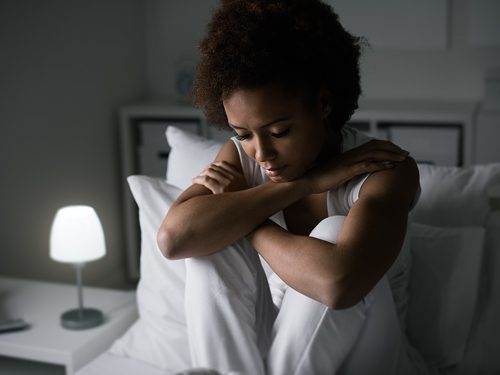 A study in the Journal of Addiction Medicine found that people in the early stages of recovery suffer from insomnia at a rate that’s five times higher than that of the general population.
A study in the Journal of Addiction Medicine found that people in the early stages of recovery suffer from insomnia at a rate that’s five times higher than that of the general population.
In most cases, this is only a temporary problem. However, finding ways to improve your sleep quality is crucial to maintaining your sobriety. When you’re not getting the rest you need, your judgment and self-control are impaired—making you more vulnerable to relapse.
How Addiction Affects Sleep
The typical adult needs seven to eight hours of rest each night to function optimally. You may be able to function on less sleep intermittently, but repeatedly failing to meet this target can affect your mood, energy level, and cognitive function.
Different types of addictions affect sleep quality in different ways. Generally, stimulants such as cocaine contribute to insomnia by preventing the body from calming down long enough to fall asleep. Depressants such as alcohol interfere with the specific cycles within sleep, causing you to wake up briefly multiple times per night.
Over time, any addiction interferes with your body’s natural circadian rhythms. This makes it less likely that you’ll feel genuinely tired when it’s time for bed. The circadian rhythm disruption caused by addiction is a more extreme version of the one seen in shift workers who switch between working days and nights.
Individuals who suffer from a substance use disorder are also at a higher risk of developing a number of sleep-related problems. Restless legs syndrome, a condition that is characterized by an uncomfortable tingling sensation and the intense desire to move your legs when lying in a supine position, affects about one-third of people with addiction. Obstructive sleep apnea, a condition that causes individuals to stop breathing for brief periods of time throughout the night, affects about half of people with addiction.
Sometimes, psychological factors play a role in sleep issues as well. Many people get in the habit of using their addiction as a way to wind down in the evenings. This makes it more difficult to fall asleep when drinking or using drugs is no longer an option.
Tips for Coping with Insomnia
Managing insomnia requires a proactive approach. Some recommended strategies include:
- Minimize caffeine intake. Caffeine is a stimulant, so soda or coffee should be avoided in the mid afternoon and evening hours.
- Exercise. Physical activity offers a number of benefits in recovery, but one of the most important is improving your sleep quality. Aim for 45 minutes of more of exercise each day, preferably in the morning or early afternoon. Exercising too close to your bedtime can create an adrenaline rush that makes it more difficult to fall asleep.
- Make stress management a priority. Stress levels are high during the early stages of recovery, and stress interferes with your ability to sleep at night. Schedule time each day to engage in your favorite stress relieving activities, such as talking to a good friend, watching a funny movie, or spending time in nature.
- Set a regular sleep schedule. Ideally, you should go to bed at the same time and get up at the same time each day. Deviations, even on weekends, make it harder for your body to establish healthy habits.
- Create a calming sleep environment. Your bedroom should be dark, quiet, and soothing. If you have roommates with differing schedules or live in a noisy neighborhood, use a mask and earplugs to help you fall asleep.
- Develop a healthy bedtime ritual. If you relied on drugs or alcohol to get to sleep in the past, you need to create a new routine that tells your body it’s time to go to sleep. This might involve meditation, taking a warm bath, writing in a journal, or listening to soothing music in the 30 minutes before you turn off the lights.
- Know when to take a break. If you can’t fall asleep, lying in bed worrying about the problem only makes matters worse. Try getting up and reading, having a small snack, or listening to relaxing music for a bit.
- Keep a sleep diary. Recording your nightly routine, what time you go to bed, what time you wake up, and how rested you feel can help you identify environmental triggers that might be affecting your ability to get the rest your body needs.
Due to their potential for addiction, it’s best to stay away from sleep aids while in recovery. However, it’s recommended that you see your healthcare provider to rule out restless legs syndrome, obstructive sleep apnea, or any other medical conditions that could be affecting your sleep quality.





